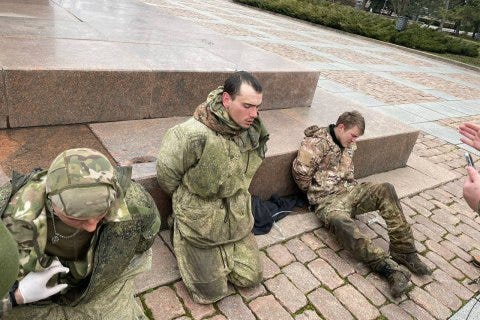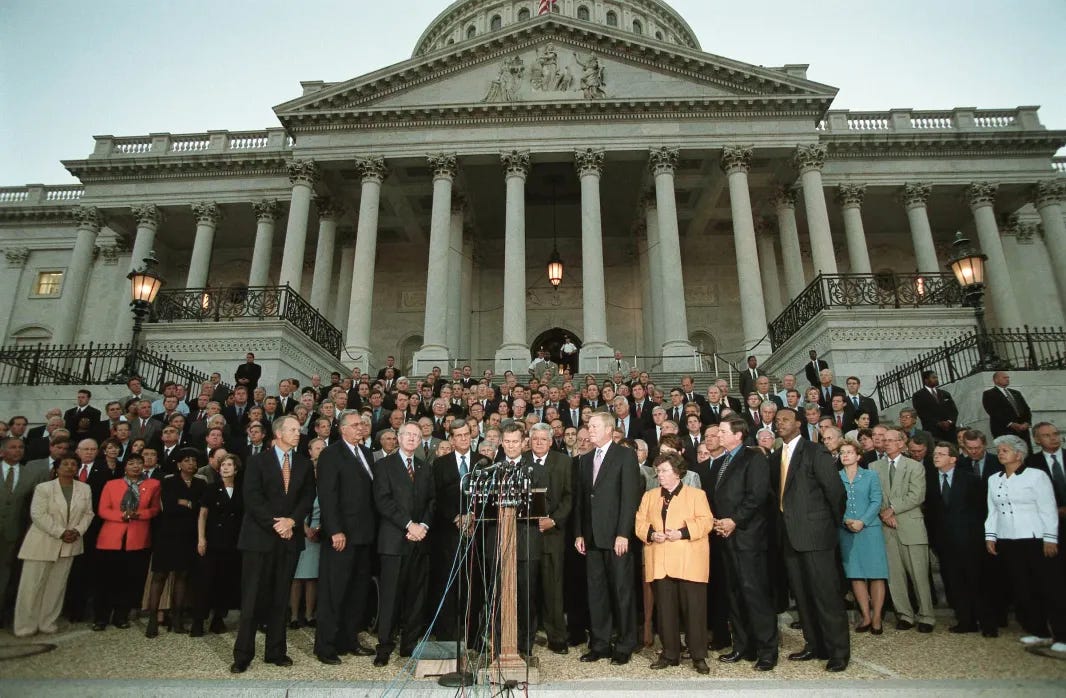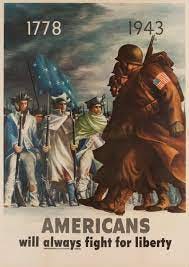It's our values stupid! Not the economy
Patriotism, the will-to-fight and resilience
Today, I’ll be discussing something that the national security community calls, “resilience” or how people, organizations or nations weather hardship and survive with their values intact. This is where patriotism lives in our head, and heart. Without it, we are defenseless.
Protecting the homeland is the primary purview of the Department of Homeland Security, in the post 9-11 era when it was formed. In fact, they have an entire portion of their mission dedicated to resilience. The problem is that part of their mission, completely avoids the most critical type of resilience… resilience from influence by foreign and domestic threats. While that I believe the hard-working professionals at DHS, largely do a great job with most threats, they and the US national security community utterly fail when it comes to dealing with any influence threat.
Adversarial influence is the single biggest threat to our nation and its values. Yes, this is my personal and professional opinion. Let me take a moment to explain why. The most basic explanation is the belief that we can do anything, so long as we are united. This requires that we dig deep and put country over party in pursuit of our goals. Going to the moon is a great example. The US military and the greater natsec community talks a lot about, “will to fight.” Here’s a quote from Ben Connable and Michael McNerney in an excellent 2018, War on the Rocks article.
America’s military argues that “will to fight” — the disposition and decision to fight, act, or persevere — is the most important factor in war. In this view, war is a fundamentally human endeavor. Military force is used to bend and break the enemy’s will. This view is entirely correct, but in practice, America’s military tends to treat war as a fundamentally mechanical process, driven by acquisitions and technology.
- Ben Connable and Michael McNerney
When it comes to conflict, kinetic or non-kinetic (fighting, arguing or competing), the will to fight is nearly always, the deciding factor. You cannot have a will to fight without a resilient identity. “Putin’s War” against Ukraine is a perfect example when it comes to an absence of will to fight. Ukraine’s patriotism to defeat an immoral and genocidal aggressor is precisely based on their will, grounded in a unified national identity. Countless reports of Russians fleeing the draft, surrendering and failing to fight, are the exact opposite of a will to fight. They are NOT resilient.

Narrative identity applies to both individuals and any type of organized collection of individuals, including nations. The United States, just like other groups of people has its own unique narrative identity (NI) and like those others, it evolves slowly over time, just like a river slowly changes course. When a nation’s NI no longer unites them, the entire nation becomes exceptionally vulnerable to outside or insider threats. For example, today’s US right and left have long sought to alter our NI in a manner that helps them win elections. One keeps it between the lines of traditional American values, albeit with an identity with far wider interpretations than our original values and the other, more along the line of Russian values, authoritarian, dominated by the extremely wealthy and which suppresses the rights of the people.
What both “sides” must acknowledge is that when they significantly distance themselves from our core values, they both harm our resilience. The US constitution and our long held “traditional values” are the guardrails of our national, NI. This makes all culture wars a threat to our NI, hence a threat to national security. Like where I began this article, a threatened NI equals a lack of, “will to fight.”
I will leave y’all with examples. After 9-11, not only did common human values around the world, unite us against violent extremism, but they brought America together to unite in our fight against one form of violent extremism. Who can forget Congress, united on the steps of the Capital singing patriotically together? Prior to WW II, the US faced very similar national and global dynamics as we do today. Populists and fascists turned the globe into a battlefield with untold suffering. US politics included socialists, the Klan, neo-Nazis, Republicans, Democrats, the wealthy elite and economic distress.

As an expert on influence in regard to national security and an expert on the basis for all influence, narrative, I can tell you that resilience is based on our individual and group identity. One critical aspect of that identity is based on the values that unify our nation. Hence, without a focus on our national values, we are defenseless against adversarial influence and attack. This is where the USG government has completely dropped the ball, post 9-11. This final week before midterm elections, it’s quite clear that America is now operating on at least three versions of our national values, one accurate, albeit with expanded and occasionally unachievable elements, another the other extremist and finally, those of us in the middle still adhering to our hereditary values. This is a critical vulnerability to our nation and its resilience to foreign attack, including domestic extremist attacks, regardless of ideology.
I firmly believe that democracy holds the key to freedom, prosperity, peace, and dignity. We must now demonstrate — with a clarity that dispels any doubt — that democracy can still deliver for our people and for people around the world. We must prove that our model isn’t a relic of history; it’s the single best way to realize the promise of our future. And, if we work together with our democratic partners, with strength and confidence, we will meet every challenge and outpace every challenger
President Biden
Introduction to the NSS
2022
Narrative identity applies to both individuals or any type of organized collection of individuals, including nations. The United States, just like other groups of people has its own unique narrative identity (NI) and like those others, it evolves slowly over time, just like a river slowly changes course. When a nation’s NI no longer unites them, the entire nation becomes exceptionally vulnerable to outside or insider threats. For example, today’s US right and left have long sought to alter our NI in a manner that helps them win elections. One keeps it between the lines of traditional American values, albeit with an identity with far wider interpretations than our original values and the other, more along the line of Russian values, authoritarian, dominated by the extremely wealthy and which suppresses the rights of the people.
What both “sides” must acknowledge is that when they significantly distance themselves from our core values, they both harm our resilience. The US constitution and our long held “traditional values” are the guardrails of our national, NI. This makes all culture wars a threat to our NI, hence a threat to national security. Like where I began this article, a threatened NI equals a lack of, “will to fight.”
I will leave y’all with examples. After 9-11, not only did common human values around the world, unite us against violent extremism, but they brought America together to unite in our fight against one form of violent extremism. Who can forget Congress, united on the steps of the Capital singing patriotically together? Prior to WW II, the US faced very similar national and global dynamics as we do today. Populists and fascists turned the globe into a war. US politics included socialists, the Klan, neo-Nazis, Republicans, Democrats, the wealthy elite and economic distress.
All of these special interests, combined with the stress of food insecurity, violence and oppression, were at each other’s throats attempting to dissolve traditional NIs and replace them with authoritarian and fascist values. Common human and US values, like post 9-11 brought America and the world together to destroy fascism and unite over freedom. To achieve this, it required every ounce of our will to fight as underpinned by our NI/ common values.
My fear, when I fail to see Homeland Security and the rest of the national security community fail to address this critical vulnerability today, I see not only current failure to support our traditional values in unity, but the impending demise of all the promise our democracy holds for common human values.
Post 9-11, the US government and soon afterwards, DHS, engaged the American people every day and all day about threats. Today, not a word of actual engagement. The only predictably influential manner to engage audiences and reunite us over our real values or “will to fight,” is via sound, narrative principles. I count a pathetically small number of true experts on narrative and narrative identity within the national security community today. This my friends, risks all that we’ve achieved in the last two and a half centuries of our “great experiment.”
If the national security community doesn’t start supporting our will to fight, via sound narrative principles and rebuilding a unified version of our traditional values, our future national prospects are dim at best and eventually will be, “lights out.”



Hi Paul, thank you for the essay above. I found your thoughts on narrative identity and national security interesting and useful. As I was reading, I had several questions. I hope you will find these questions worth answering.
1) what is your bullet list of our core American values, or heritage values?
2) do you conceptualise values as always positive? do we also hold negative values?
3) can and should core values (and therefore core narrative identity) evolve and change?
4) can we differentiate positive value evolution from negative evolution (or 'value decay')?
5) have there always been deep value divides in American culture, which are now more evident but not different in kind than the identity split during the Civil War (first, not current!)?
6) how do we differentiate 'accurate' from 'inaccurate' values? perhaps you mean 'authentic' rather than accurate, since values are by definition about meaning rather than truth values (to quote you from elsewhere).
7) does the national security community truly own the mission to restore American values to Americans? or is that a more intrinsically civil society task? As a retired member of the national security community, I heartily endorse American citizens owning the responsibility for maintaining, communicating, and cultivating our foundational values. Outsourcing the maintenance and development of core American values to our security community puts us at the mercy of that community, should it fall into toxic narrative psychosis. I tend to conceptualise the nat sec community as having the responsibility for communicating positive American values through every means possible, but particularly through enactment both at home and abroad.That includes the ability to reflect those values in key strategic narratives accurately, authentically and effectively. However, I tend to think that nat sec should reflect the best of what we are, rather than attempt to build Americans into our current forms of 'be best.' (you know where that got us!)